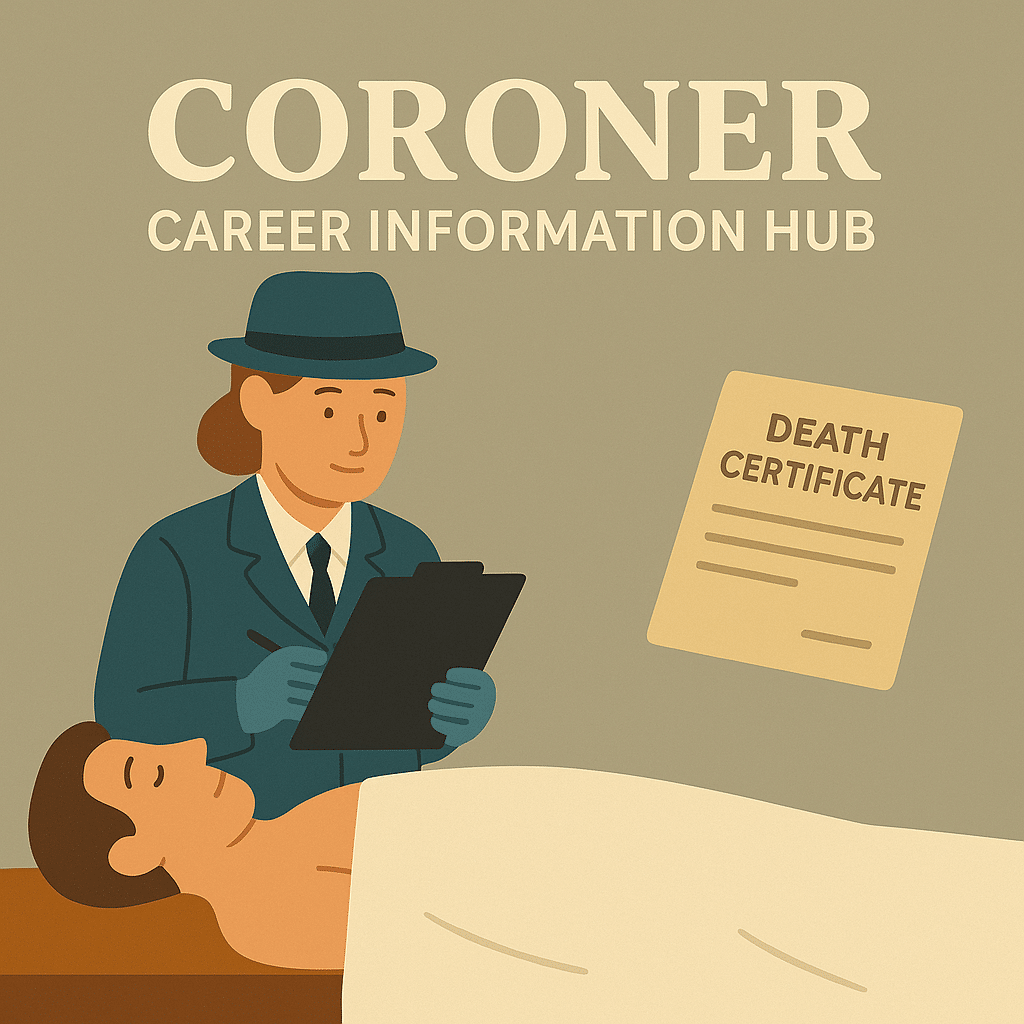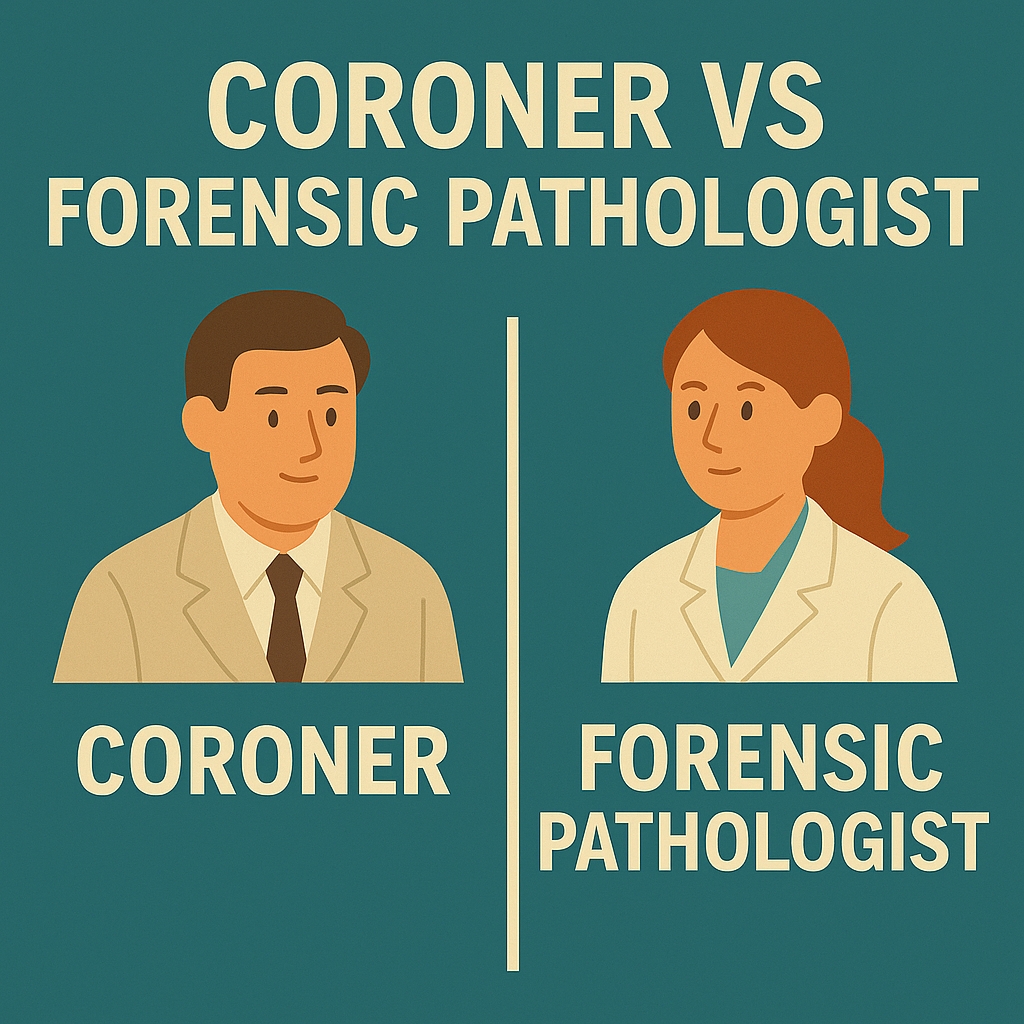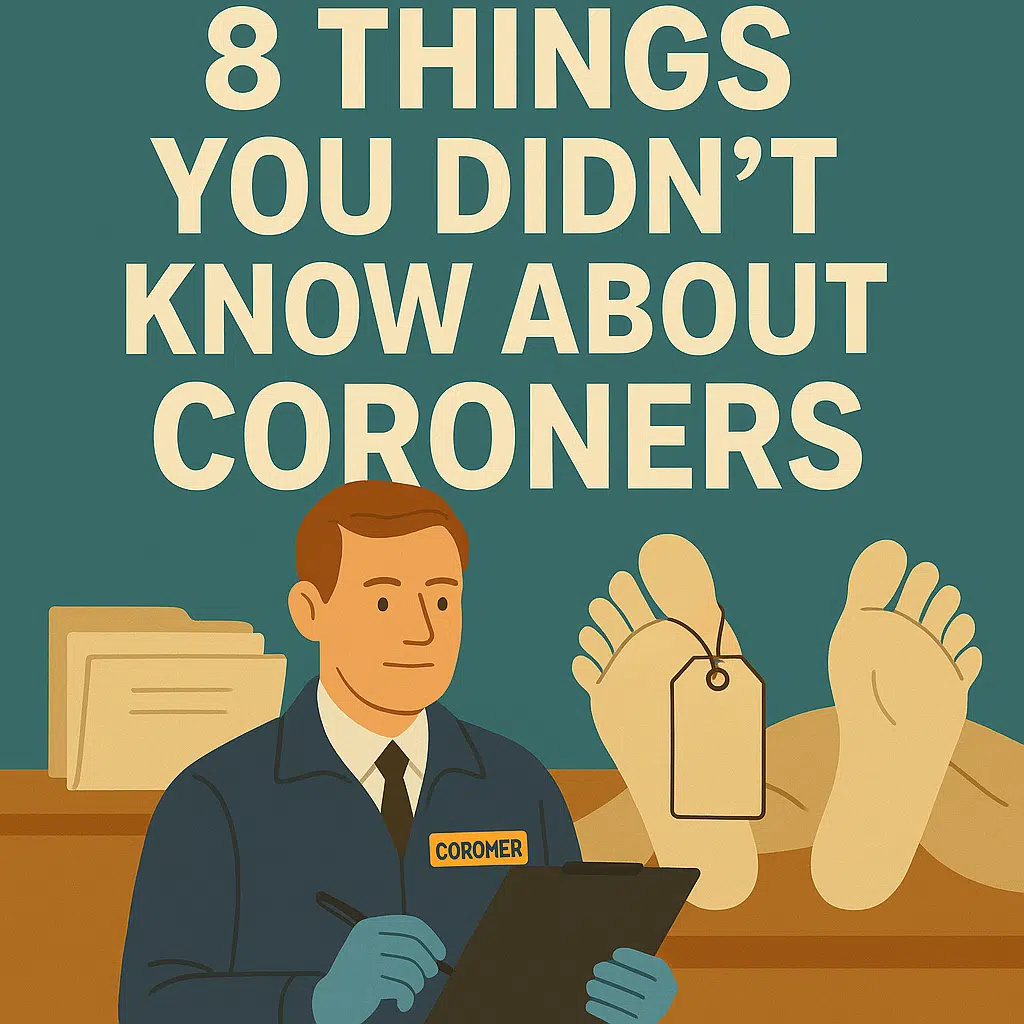Where Death Meets Detective Work
The Coroner Careers Information Hub
When someone dies unexpectedly, it’s the coroner’s job to find out what happened. Equal parts investigator, record keeper, and public servant, coroners help determine the cause and manner of death, ensure proper documentation, and support families and communities in times of loss. If you’re drawn to truth, detail, and dignity in difficult moments, this might be the path for you.

Table of Contents
Key Things To Know
Coroners oversee death investigations, but they are not the same as forensic pathologists. In most areas, coroners do not perform autopsies. However, in certain jurisdictions, one person can hold both roles if they are a licensed medical doctor.
-
Not always a doctor: In many counties, coroners are elected officials and are not required to have a medical degree.
-
Sometimes both roles are combined: In a few jurisdictions, a forensic pathologist may also serve as the coroner. This typically happens in larger or urban systems where legal and medical oversight are handled by the same person.
-
Varies by jurisdiction: Some areas use medical examiners instead of coroners. Medical examiners are usually physicians and are appointed rather than elected.
-
Investigative role: Coroners examine evidence, review medical records, and decide whether additional investigation or an autopsy is needed.
-
Works with many agencies: Coroners collaborate with law enforcement, forensic pathologists, hospitals, and public health departments.
-
Autopsies are not always required: Many deaths are certified based on records and circumstances without needing a full autopsy.
-
Responsible for legal paperwork: Coroners complete and sign death certificates and maintain accurate case records.
-
May respond to scenes: Especially in rural counties, coroners may visit death scenes to collect information firsthand.
-
Communicates with families: Coroners often notify next of kin, explain findings, and help guide families through official processes.
Why Choose This Career?
Becoming a coroner is not for the faint of heart. It is for people who care deeply about truth, dignity, and service. If you are curious, calm under pressure, and motivated to help communities find answers during life’s hardest moments, this career offers a rare mix of purpose and practicality. You will play a critical role in both public health and the justice system, often providing families with the clarity they need to begin healing.
Job Responsibilities
Coroners are responsible for overseeing death investigations and ensuring accurate legal and medical documentation.
While duties vary by jurisdiction, common responsibilities include:
-
Determining the cause and manner of death
-
Ordering and reviewing autopsy reports
-
Collecting and evaluating evidence from death scenes
-
Interviewing witnesses, family members, and law enforcement
-
Completing and signing death certificates
-
Notifying next of kin and providing guidance
-
Coordinating with forensic pathologists and medical examiners
-
Maintaining detailed case records and legal documentation
-
Testifying in court when required
-
Supporting public health efforts through accurate death reporting
Education and Certification Requirements
The qualifications to become a coroner vary significantly depending on your location. In some counties, the position is elected and requires only a high school diploma or GED. In others, especially larger or urban areas, the role is filled by appointment and may require advanced medical or forensic credentials.
Here’s what you should know:
-
Minimum legal requirement: In many jurisdictions, a high school diploma or GED is enough to run for coroner, especially if it is an elected position.
-
Real-world expectations: While the legal bar may be low, most successful candidates have backgrounds in law enforcement, nursing, emergency response, forensic science, or criminal justice.
-
Training programs: States often require new coroners to complete a certified training course in death investigation, legal procedures, and handling evidence. This is usually required within a certain time after taking office.
-
Appointed positions: Some counties or states appoint coroners and prefer candidates with more formal education or related professional experience.
-
Continuing education: Many jurisdictions require ongoing training in forensic methods, documentation, and public health reporting throughout your service.
In short, while a formal degree may not be required everywhere, having related experience and a strong grasp of investigative procedures can improve your effectiveness and your chances of getting the job.
How To Get Started
Thinking about becoming a coroner? Your next steps will depend on where you live and whether the position is elected or appointed. Here's how to begin:
-
Check local requirements
Start with your county or state website. Look for eligibility criteria, required training, and whether the role is elected or appointed in your area. -
Build relevant experience
Backgrounds in law enforcement, healthcare, EMS, forensic science, or public administration are all helpful. Volunteering or shadowing in related fields can also provide valuable insight. -
Get familiar with death investigation training
Some states offer or require specific courses for coroners, especially after election or appointment. Look into programs offered through medicolegal associations, state police academies, or community colleges. -
Decide if you want to run or apply
If the role is elected, you’ll need to file the appropriate paperwork, campaign, and win community trust. If it’s appointed, prepare a résumé that highlights relevant experience and certifications. -
Connect with professionals in the field
Reach out to current coroners or medical examiners to learn more about the work. Attending professional conferences or joining state or national associations can help build your network. -
Stay current and committed
Once in the role, continuing education is often required. Stay updated on legal changes, forensic advancements, and public health protocols.
Related Professional Organizations and Certifications
Whether you're just starting out or looking to grow in your role, these organizations offer training, networking, and certification opportunities to support your work in death investigation and public service.
-
American Board of Medicolegal Death Investigators (ABMDI)
abmdi.org
Offers voluntary certification for death investigators, widely recognized in the field. ABMDI certification demonstrates professionalism and a standardized level of knowledge in medicolegal investigations. -
National Association of Medical Examiners (NAME)
thename.org
Although primarily for physicians, NAME sets standards for death investigation systems and provides valuable educational resources for coroners and medicolegal professionals. -
International Association of Coroners and Medical Examiners (IACME)
theiacme.com
Offers membership, accreditation programs, and continuing education for coroners and medical examiners. Focuses on improving professional practices and public service. -
American Academy of Forensic Sciences (AAFS)
aafs.org
A multidisciplinary professional organization that supports forensic professionals, including those involved in death investigation. -
Medicolegal Death Investigators Training Courses
Often offered through state police academies, community colleges, or universities. Check with your local jurisdiction for approved programs.
Common Myths
TV dramas and urban legends have shaped some strange ideas about what coroners actually do.
Here’s what the job really looks like, compared to the myths:
-
Myth: Coroners perform autopsies.
Reality: Autopsies are usually performed by forensic pathologists. Coroners may order them but typically do not perform them. -
Myth: You need to be a doctor to be a coroner.
Reality: In many places, coroners are not medical doctors. Some are elected officials with backgrounds in law enforcement or public service. -
Myth: The job is all science and no paperwork.
Reality: A big part of the role involves documentation, reporting, and legal recordkeeping. -
Myth: Coroners only show up for murders.
Reality: Coroners investigate many types of deaths, including accidents, suicides, unattended natural deaths, and more. -
Myth: You’re always at crime scenes.
Reality: While some coroners do respond to scenes, much of the job happens behind a desk, reviewing files and coordinating with other agencies. -
Myth: The work is cold and clinical.
Reality: The role often involves working closely with grieving families and helping them navigate confusing and emotional situations.
What Makes Someone A Good Fit
Being a coroner is not just about handling paperwork or managing logistics. It's about stepping into one of the most emotionally charged moments of someone’s life and bringing clarity, calm, and care.
The work is detailed, sensitive, and often unpredictable. People who thrive in this role tend to share a few key traits:
-
Detail-oriented
Small oversights can lead to big problems. You need to catch inconsistencies and keep thorough records. -
Calm under pressure
You may be called to the scene of traumatic or unexpected deaths. Staying steady matters. -
Empathetic communicator
Delivering difficult news and guiding grieving families takes compassion and professionalism. -
Ethical and trustworthy
The job involves legal documents, sensitive information, and public accountability. -
Organized and process-driven
You’ll juggle reports, timelines, and multi-agency coordination. Systems are your friend. -
Comfortable with the realities of death
If you are squeamish or emotionally overwhelmed by death, this role may not be a good fit. -
Willing to learn
Procedures, laws, and expectations can change. A good coroner keeps learning and adapting.
Articles
Frequently Asked Questions
Have questions about what it takes to become a coroner or what the job actually involves? You're not alone. Here are some of the most common questions we hear.
Disclaimer: The information provided on this website and by Buried in Work is for general informational purposes only and should not be considered legal advice. Please consult with a qualified attorney or subject matter expert for advice specific to your situation.


